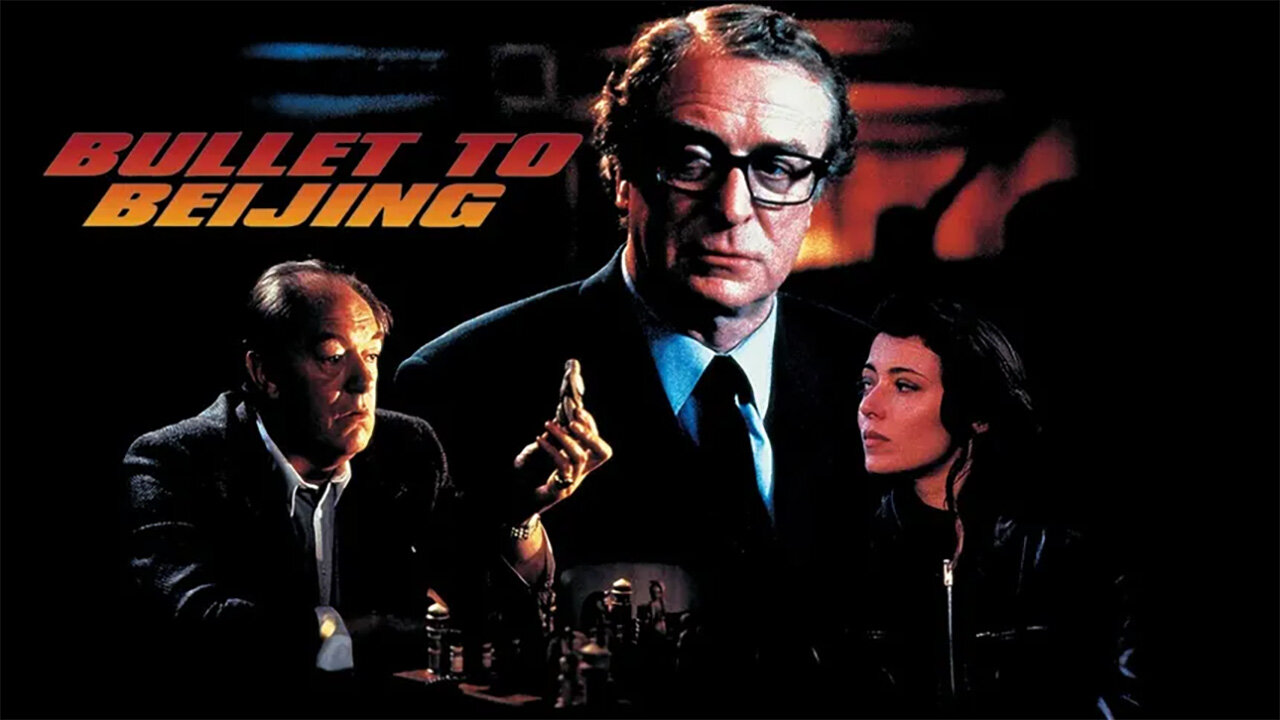Premium Only Content

'Bullet to Beijing' (1995) Movie of 10th Harry Palmer Installment
'Bullet to Beijing' (1995), directed by George Mihalka, is a curious revival of one of British cinema’s most sardonic spies: Harry Palmer. Played again by Michael Caine, nearly three decades after his debut in 'The Ipcress File' (1965), Palmer returns not to Cold War London but to the volatile post-Soviet landscape of the 1990s. The result is a film that sits awkwardly between eras—nostalgic in tone, but uncertain in purpose, caught somewhere between the gloomy bureaucratic espionage of its roots and the gaudy, globalised intrigue of the new world order.
The story begins with Palmer being forcibly retired from British intelligence, apparently a victim of political cost-cutting and irrelevance in the post-Cold War environment. Caine, now older but still slyly charismatic, plays the scene with weary bemusement—he is the same old Palmer, cynical, detached, and sharper than the fools above him. But times have changed. Instead of quietly observing the contradictions of British intelligence, Palmer is soon swept up in a private espionage mission involving Russian gangsters, biological weapons, a train to Beijing, and a shifting maze of allegiances.
The film's plot—such as it is—concerns a stolen biochemical weapon called "Alorex," a MacGuffin of the highest order. Palmer is hired by a Russian businessman with questionable motives to recover it, taking him on a journey from London to Moscow to Siberia, and finally toward Beijing. Along the way, he’s joined by a younger agent named Nikolai, played by Jason Connery, who serves as a kind of understudy or foil. But despite the geographical sprawl and Cold War echoes, the film rarely gains narrative momentum. Instead, it drifts through loosely connected scenes of double-crosses, rail journeys, and vaguely sinister conversations, punctuated by occasional gunfire or intrigue.
Caine remains the film’s greatest asset. He wears the role of Palmer like an old coat—comfortable, slightly musty, and perfectly tailored. His sardonic wit, eye for hypocrisy, and unhurried delivery anchor the story even when it wobbles. But the film asks too much of him. The supporting cast, while competent, lacks the edge or complexity of the earlier Palmer films. Jason Connery’s Nikolai is bland and largely unnecessary. Michael Gambon appears as a shadowy figure named Alex, adding some gravitas, but he too is underused.
One of the more striking features of 'Bullet to Beijing' is its visual tone. Shot in a post-Soviet landscape, the film captures a world in decay—crumbling Soviet architecture, grey snow-bound streets, fading symbols of a once-global superpower. This backdrop could have been used to comment on the ideological confusion of the post-Cold War era, but the film hesitates to say anything coherent. It flirts with cynicism but never commits. It gestures toward political intrigue but avoids depth.
Perhaps the biggest problem is tone. The original Harry Palmer films were defined by their cool detachment and working-class sensibility, a deliberate contrast to the flash and fantasy of the James Bond franchise. But in 'Bullet to Beijing', the film can’t decide whether to replicate that sardonic realism or chase the more colourful thrills of 1990s action cinema. As a result, it does neither especially well. There are flashes of style—a clever line here, a sudden betrayal there—but the overall impression is one of nostalgia diluted by lack of direction.
Still, there is something poignant about seeing Palmer navigate this new geopolitical landscape. He does not belong here—not in this world of Russian oligarchs, freelance spies, and decaying ideologies. And neither, really, does the film. It feels like an artefact from an earlier time, unsure of its place in a post-Soviet, post-modern world. In this sense, the film’s own confusion becomes thematic: Palmer is a Cold War relic, walking through the ruins of history, watching as the old rules are rewritten by men who understand business more than politics.
In conclusion, 'Bullet to Beijing' is a film that never quite finds its footing. It brings back a beloved character and gives him a promising premise, but it lacks the sharpness, structure, and urgency that defined the earlier entries. For fans of Michael Caine and the Harry Palmer series, it offers moments of charm and familiarity, but those moments are fleeting. Like the train to Beijing, the film takes a long time to arrive—and when it does, you’re not quite sure why you came.
-
 48:15
48:15
SouthernbelleReacts
1 day ago $3.15 earnedWeapons (2025) REACTION | Josh Brolin, Julia Garner, Alden Ehrenreich | Horror-Mystery Thriller
8.62K17 -
 39:36
39:36
mizery
4 days ago $0.18 earnedI Mastered Fortnite in 30 Days
2.91K5 -
 25:50
25:50
ChopstickTravel
18 days ago $0.79 earned24 Hours With Sri Lanka’s Vedda People!! (Barehand Honey Harvest)
6.87K4 -
 8:13
8:13
Danny Rayes
1 day ago $0.81 earnedMost Hated Teacher on Tiktok
3.82K5 -
 15:31
15:31
Chris Harden
9 days ago $1.10 earnedWhat Happened to Kewanee, Illinois?
5.26K6 -
 10:13
10:13
JohnXSantos
1 day ago $0.33 earnedThis AI Tool Makes Product Manufacturing 10X Smarter (FOR FREE)
3.55K3 -
 16:28
16:28
Artur Stone Garage
12 days ago $0.68 earned$1000 AUDI A4 — WILL IT START After 10 Years?
5.85K1 -
 26:57
26:57
Advanced Level Diagnostics
18 days ago $0.31 earned2021 Ram Promaster - No Crank! Key Stuck In Ignition! Diag & Fix!
4.07K1 -
 8:11
8:11
MattMorseTV
18 hours ago $18.73 earnedTrump's DECLARATION of WAR.
37K93 -
 3:44
3:44
GritsGG
16 hours agoUpdate Your Warzone Loadouts w/ These Tips!
16.4K1